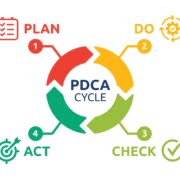Setting the standard for excellence: crafting effective policies for your veterinary practice
As a veterinary practice, you are responsible for providing high-quality care to your patients and clients. But with the many complex and challenging situations that can arise in the course of daily operations, it can be tough. That’s where policies come in. By providing clear guidelines and parameters for behaviour and actions, policies help to support decision-making, maintain quality of care, and promote a culture of excellence in your practice.

What is a policy?
A policy is a statement that conveys the values, culture, philosophies, goals, and limits of your organization. It helps in decision-making and serves as a link between your organization’s vision, values, and daily operations. Procedures, also known as standard operating procedures (SOPs), are detailed instructions that provide specific steps to execute a policy. They are a part of policies but are more specific and detailed.
Why are policies useful for vet practices?
Key benefits of having policies in place include:
- Set guidelines and parameters for employees to successfully reach their goals with confidence
- Increase compliance with regulatory and professional standards
- Improve the quality of the care being delivered to patients and clients
- Support decision-making during difficult or complex situations to avoid a crisis
What policies should a vet practice have?
As a veterinary practice, there are specific policies that you should have in place. These policies include:
- Health and Safety Policy
- Code of Conduct Policy
- Complaints Policy
- Data Protection Policy
- Waste Management Policy
- Biosecurity Policy
- Staff Training and Development Policy
Who should be involved in making policies?
Responsibility for policy-making can vary depending on the type of policy and the size or structure of the company. In a small company, it might be the business owner, while in a corporation, it could be the head office. For specialist services or offerings, it might be the departments themselves. It’s important to involve subject matter experts and conduct research to reflect the latest regulations and standards.
How should policies be structured?
A policy document should include the following:
- Document control: Who created and approved the document, who edited last and what version is it?
- Purpose: What is the policy about?
- Statement: This is the core of the document. What is the policy statement of your organization specific to the topic?
- Procedures: What procedures might sit within this policy?
In the statement, consider the what, why, when, who, and basic how (this will be elaborated on in each procedure that comes out of it). It may be important to lay out the responsibilities for certain roles in this area in some detail. Further useful reading on writing a specific sustainability policy can be found here by the BVA.
Top tips for creating policies
- To make it easier to read, use simple, easy to understand language and have a set structure to each policy
- Think about what you want to achieve with your policy and ask yourself ‘what if’ to see if it covers the most common eventualities
- Learn about what needs changing by piloting it as quickly as possible with operational teams
When should policies be reviewed?
Policies are not changed very often (unlike procedures), and when they are, will involve many stakeholders from across the company. Policies should be reviewed periodically to ensure that they remain current and relevant. Examples of when you might want to review and update policies include:
- Existing policies are not robust enough.
- Outdated policies with new technologies, systems or services offered.
- Changes in regulations and professional standards.
In conclusion, having policies in place is essential for the success of your veterinary practice. They provide clarity around how to run the practice within the context of the organisation (e.g., values, mission), regulatory requirements (e.g., health and safety), and professional standards (e.g., code of conduct). For more help withe reviewing or crafting your own policies, Contact VetQI.





